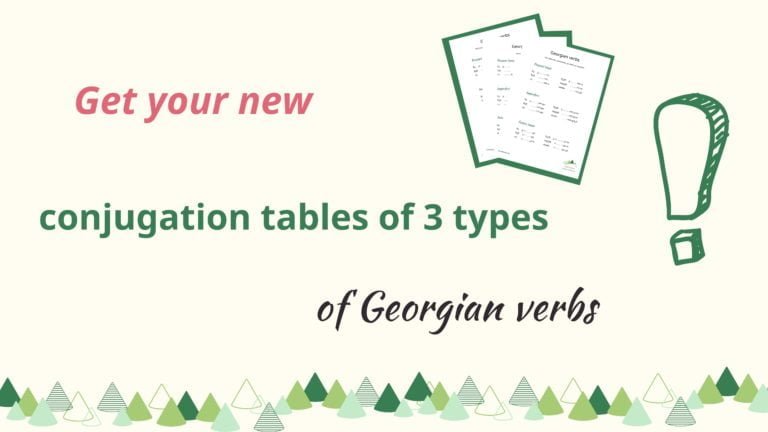My name is – how to say it in Georgian? This is a basic sentence that you’ll encounter in many daily situations. You may be asked by your new Georgian friends or the receptionist in a hotel. That is why it’s high time to learn it.
Similarly to other languages, there are several ways to say it. Therefore today we’ll walk you through both, the easier and more complex ways of passing the information about your name and surname in Georgian.
How to say “I am …” in Georgian?
Let’s start with the easiest way of introducing yourself in Georgian. Use it whenever you have forgotten any other form. This may be useful, especially, when you have just started learning Georgian and talking in Georgian . The most sufficient here would be to use the verb “to be”, so ყოფნა:
მე ჯონი ვარ – I am John.
This is how John would introduce himself when starting learning Georgian. You just use your name and add the conjugated verb „to be” to it. More about conjugation of the verb „to be” you may read in this article.
What will happen, if you want to ask your new friend, what is their name? In this case the easiest way is to add “And you?” in the end. In Georgian it will be შენ? (for singular) თქვენ? (for plural or the formal way of addressing).
How to say “My name is” in Georgian?
Mostly in some formal situations you may be asked to provide your name and surname. Therefore, the first thing what you need it to know those two words in Georgian.
The name is სახელი and the surname in Georgian will be გვარი. To create a sentence with those words all you need additionally are: the possessive pronouns and the verb „to be”. So our beloved John would say:
ჩემი სახელი ჯონი არის. – My name is John.
But John may add also what his surname is and it will be like this:
ჩემი გვარი სმითი არის. – My surname is Smith.
How would the question look like, when someone asks you about your name and surname? Then it may simply look like: თქვენი სახელი და გვარი? – Your name and surname? As simple as that.
As an alternative you may hear რა გვარი ხართ? – What name are you of? If you want to translate it as literally as possible. The words “name” and “surname” will be useful in any formal situations, e.g. when you apply for anything, e.g. sim card.
How to use the verb “to be called/named”?
The time has come to use the full form, a bit more complex, but more often used as well. Hence we are learning it as the last one. It is connected to the verb “to name sb” or „be named” – in the latter form we’ll be using it today. The infinitive form of the verb is დარქმევა and the conjugation looks as follows:
მე მქვია
შენ გქვია
მას ჰქვია
ჩვენ გვქვია
თქვენ გქვიათ
მათ ჰქვიათ
You may immediately notice that this conjugation is different than of the other verbs like „to work” or „to do”. So, what would say John Smith if he wants to introduce himself this way?
He’ll say:
მე ჯონი სმითი მქვია.
As you may notice we use the name and surname in 1st case and the person who is named is in 3rd case. But that’s not all what John wants to say to his new friends in Georgia. He wants to introduce his friend Maia to others as well. Then he’ll say:
ამ გოგოს მაია ჰქვია. – This girl is named Maia (Her name is Maia).
With such a successful conversation John decided to go further and ask other people about their names:
რა გქვია? – What is your name (What are you called)?
Having this you are able to conduct your conversations on what is your and other people’s names and surnames.
How to learn saying "My name is" in Georgian?
The best way is to start practicing saying My name is in Georgian by writing simple dialogues using all of those 3 forms. So one dialogue with the easiest, then more complicated, etc. This will give you bigger fluency in saying this. The second way is to use this actively (so when speaking) all the time when you are either in Georgia or you meet Georgians. Even if those will be the only 2 sentences in Georgian and the rest in English, it’s worth doing it. Try practicing it by mixing forms. Firstly use the easier form, then the other one with verb and see how it’s going.

